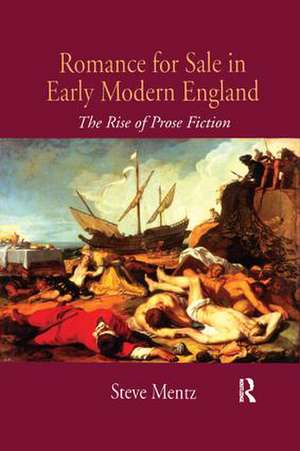Romance for Sale in Early Modern England: The Rise of Prose Fiction
Autor Steve Mentzen Limba Engleză Paperback – 9 oct 2017
| Toate formatele și edițiile | Preț | Express |
|---|---|---|
| Paperback (1) | 469.34 lei 6-8 săpt. | |
| Taylor & Francis – 9 oct 2017 | 469.34 lei 6-8 săpt. | |
| Hardback (1) | 823.63 lei 6-8 săpt. | |
| Taylor & Francis – 27 mar 2006 | 823.63 lei 6-8 săpt. |
Preț: 469.34 lei
Nou
Puncte Express: 704
Preț estimativ în valută:
89.81€ • 94.02$ • 74.31£
89.81€ • 94.02$ • 74.31£
Carte tipărită la comandă
Livrare economică 05-19 aprilie
Preluare comenzi: 021 569.72.76
Specificații
ISBN-13: 9781138250925
ISBN-10: 1138250929
Pagini: 272
Dimensiuni: 156 x 234 x 14 mm
Greutate: 0.45 kg
Ediția:1
Editura: Taylor & Francis
Colecția Routledge
Locul publicării:Oxford, United Kingdom
ISBN-10: 1138250929
Pagini: 272
Dimensiuni: 156 x 234 x 14 mm
Greutate: 0.45 kg
Ediția:1
Editura: Taylor & Francis
Colecția Routledge
Locul publicării:Oxford, United Kingdom
Cuprins
Contents: Introduction: Why early modern fiction?; Early modern romance and the middlebrow reader; Heliodorus and early modern literary culture; Anti-epic traditions: Sidney's New Arcadia; Anti-epic traditions: Greene's romances; The Homer of women: Greene and the novella; Fictions of nostalgia: Lodge versus Greene; Dishonest romance: Greene and Nashe; Conclusion: Greene's ghosts and the middlebrow author; Bibliography; Index.
Notă biografică
Steve Mentz is Assistant Professor of English at St. John's University in Queens, New York, USA. He is also co-editor of Rogues and Early Modern English Culture (2004).
Recenzii
'This learned study offers important new contexts for the prose romances”and authorial careers”of Sidney, Greene, Lodge, and Nashe. Mentz recovers a 'Heliodoran Moment' in the 1580s and 90s, vivid in its generic and rhetorical jostlings and vital in its implications for our histories of prose fiction, print culture, and the literary marketplace.' Professor William H. Sherman, University of York, UK 'This lively study offers original perspectives on two processes that have attracted growing critical attention: the emergence of print authorship, and the development of pre-novelistic fictions. Mentz compellingly argues that Elizabethan prose fiction was crucial to both processes, as Elizabethan writers sought models for their uncertain roles in the chance-driven narratives of Greek romance.' Lori Humphrey Newcomb, Associate Professor of English, University of Illinois at Urbana-Champaign '... engaging new study... this book is a valiant production, full of interesting detail, arresting in its novelty, comprehensive in the scope of the background reading, and worth the consideration of all students of early prose fiction.' Renaissance Quarterly ’... a rich, original and informative book which is a pleasure read: it should be essential reading for all those interested in the changing fashions of Renaissance prose romance.’ Early Modern Literary Studies ’... Mentz's study provides compelling new contexts for prose romance and for authorial careers. His study of how authors strove to situate themselves in their peritexts provides fresh insight into how popular romance sold itself.’ Journal of British Studies ’If nothing else, this book will remain a resource and point of reference for early modernists with an interest in Elizabethan prose fiction... Romance for Sale in Early Modern England represents a broad critical updating and reconsideration of the field of Elizabethan prose fiction, and it is timely as such. Many readers will welcome it.’
Descriere
Steve Mentz provides a comprehensive historicist and formalist account of prose romance, the most important genre of Elizabethan fiction. He explores how authors and publishers of prose fiction in late sixteenth-century England produced books that combined traditional narrative forms with a dynamic new understanding of the relationship between text and audience. Though prose fiction would not dominate English literary culture until the eighteenth century, Mentz demonstrates that the form began to invent itself as a distinct literary kind in England nearly two centuries earlier.

















